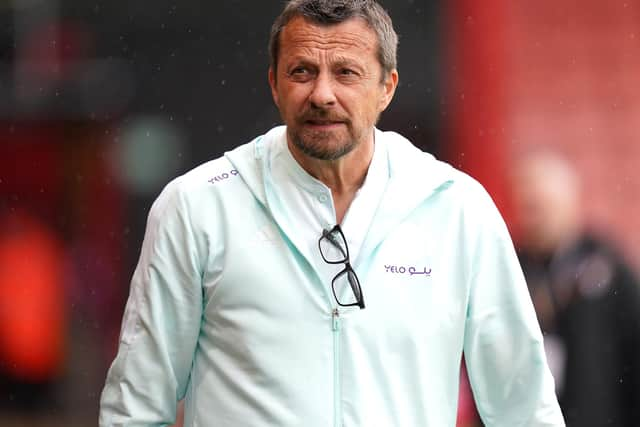Sheffield United: How the contract situation at Bramall Lane will reveal plenty about the club's long-term strategy
and live on Freeview channel 276
But the starting eleven Sheffield United selected for last weekend’s visit to Dorset has one big problem. Six of those picked are scheduled to leave next summer. The same goes for four of the substitutes named by Slavisa Jokanovic, including Chris Basham and Lys Mousset who were both deployed during the second-half.
Contracts - or their expiry dates to be exact - is the big issue at Bramall Lane nobody seems to be talking about. How best to plot a course back into the Premier League inevitably dominates the conversation there right now, with Jokanovic’s side entering the international break six points off the play-off positions after 11 Championship games. But behind the scenes, as the Serb and his staff focus on footballing issues, those tasked with ensuring the smooth-running of the club must shortly confront a situation whereby nearly 60 percent of those who featured in its last league outing will shortly become free agents.
Advertisement
Hide AdAdvertisement
Hide AdChris Wilder, Jokanovic’s predecessor at Bramall Lane, used to tell a story about a problem he encountered earlier in his managerial career wherever the subject of a new deal was being discussed. He actually used to tell two; both of which, he insisted, were still relevant despite being set in the lower reaches of the domestic game.
“I always remember an old pal of mine, a player who was coming towards the end of his career, telling me about a coach journey home following the final game of a season,” said Wilder who, having already steered them out of League One, would shortly lead United into the Premier League. “All of the lads were sat on there, going back to the ground, and they were getting called down to the front, one by one, to speak to the manager and find out if they were being kept on.
“The guy I know reckoned it was absolutely horrible. The atmosphere was really, really bad because they all knew who had just been made an offer and who had just been let go by the look on their faces. The ones who were staying couldn’t show they were happy because they didn’t want to upset their mates who weren’t. Seriously, everyone on there was in that position and that’s when I thought ‘I’ll never allow that to happen anywhere I’m in charge’ because you know it just doesn’t create the right mood. The kind of mood that’s conducive to achieving anything.”
Despite going on to guide them to a ninth placed finish in the top-flight before departing as they spiralled towards relegation last term, privately Wilder always maintained one of United’s greatest achievements on his watch was getting their administrative affairs in order. Or, as he liked to put it, “bringing the power back to the football club” by ensuring that not only were its best talents tied to lengthy contracts but also the dates when they ran out were staggered.
Advertisement
Hide AdAdvertisement
Hide Ad“You don’t want to be negotiating tons at exactly the same time because it’s a nightmare for the people up there,” he informed journalists during one media conference. “And if someone does well - and this should go for any walk of life - I think they deserve to get rewarded by knowing their future is secure.”


Although the change in landscape at United has partly come about through necessity and design - the focus on loans during the recent transfer window reflecting their drop in income following May’s return to the EFL - it should still be scrutinised. Particularly as Jokanovic is a coach as well as manager, improving those under his command over a period of time as he proved during successful spells in charge of Watford and Fulham. Morgan Gibbs-White, Robin Olsen, Ben Davies and Conor Hourihane, who were all hired on a temporary basis, may or may not depart when those agreements expire. Adlene Guedioura, United’s solitary permanent signing since the 53-year-old’s appointment, was clearly recruited with the ‘here and now’ in mind.
But it would be a shame, should he want to keep them, if the work Jokanovic undertakes with Ben Osborn, Luke Freeman, David McGoldrick, Billy Sharp and Jack Robinson goes to waste because they are lured elsewhere against his wishes, Like Basham and Mousset, they have all entered the final eight months of their present contracts.
Despite also being beaten by Middlesbrough en route to the Vitality Stadium, United’s results have improved significantly of late with Jokanovic’s side preparing for next weekend’s meeting with Stoke City handily placed to mount a push for the top six.
Advertisement
Hide AdAdvertisement
Hide AdOf course, there could be benefits to allowing so many members of his squad to enter the closing stages of their contracts - providing him with an opportunity to undertake a proper reprofiling exercise at the end of a campaign which saw United fail to win any of their opening five league games.


But it also leaves them in a vulnerable position, as John Lundstram’s protracted move to Rangers during the close season reminded. After triggering an option to retain the midfielder’s services two summers ago, United were ultimately powerless to prevent him joining the Glaswegians after Lundstram resisted all attempts to sell him during the winter window.